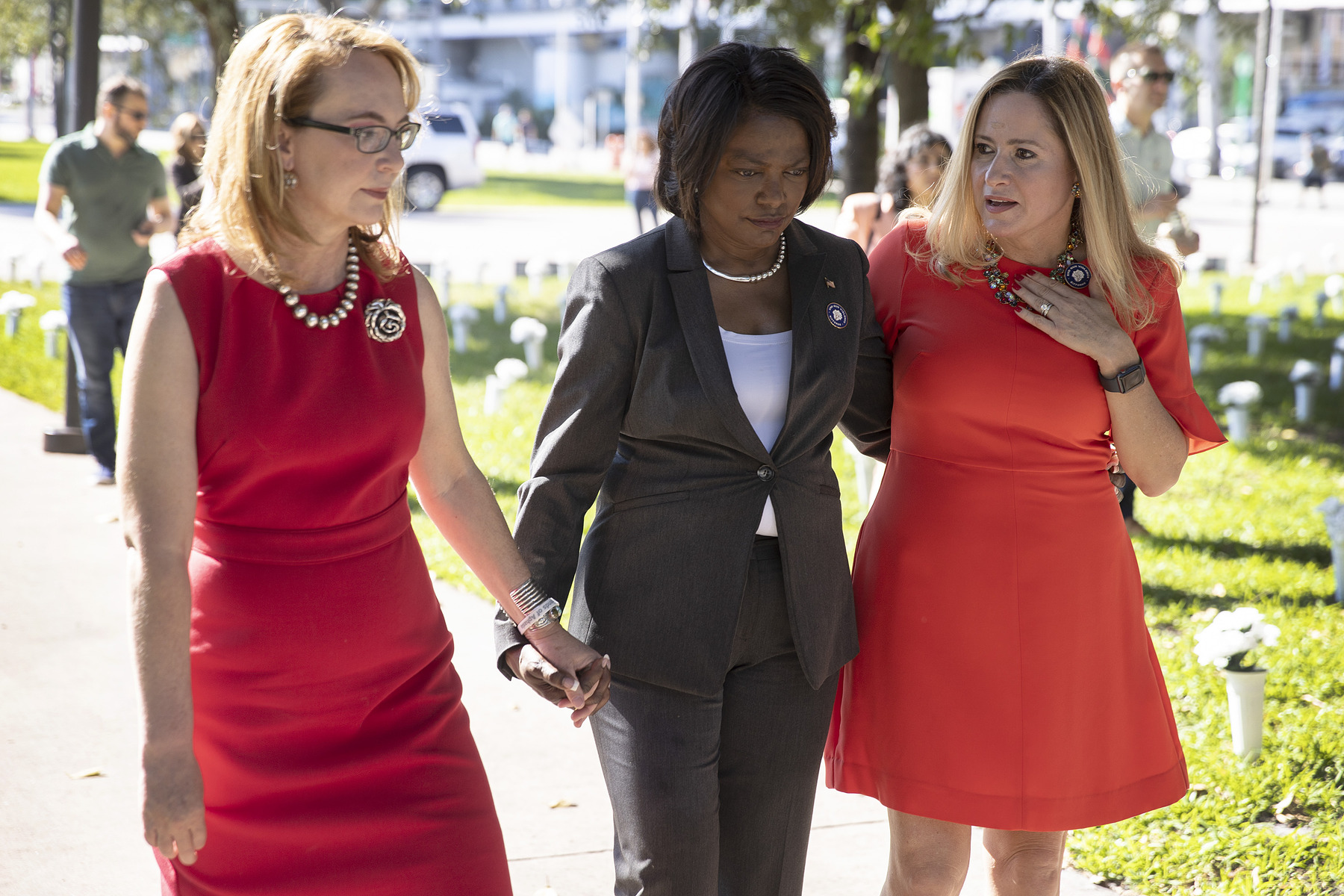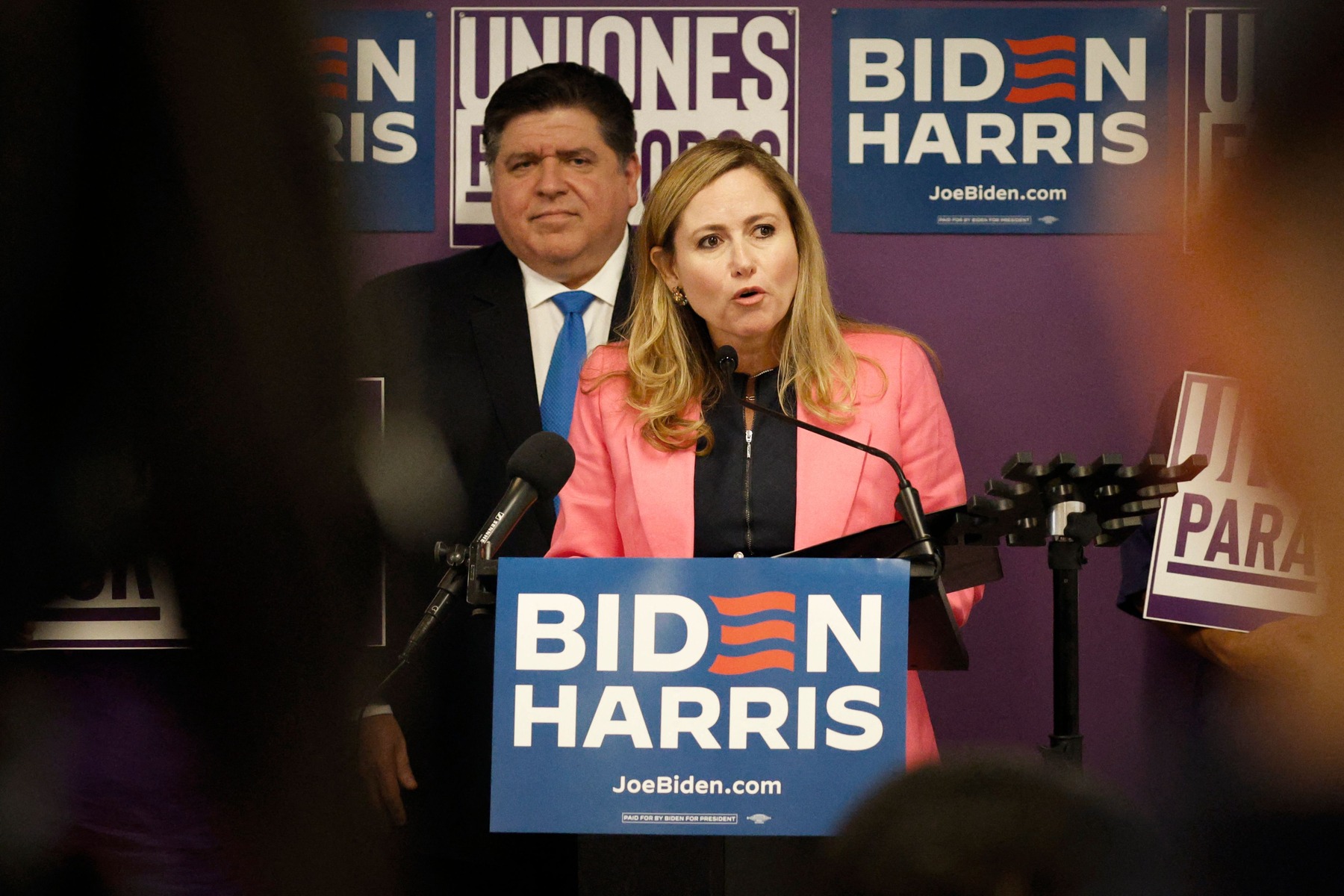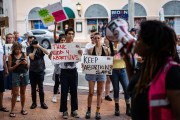ORLANDO, Fla. – Former U.S. Rep. Debbie Mucarsel-Powell took the stage during Florida Democrats’ annual gathering this fall to “La Gozadera,” a boisterous party anthem, and paired it with a message about the possibility of a long-awaited statewide victory for Democrats in the Sunshine State.
“Floridians, you know it’s true, you have been living in ground zero for attacks against our democracy,” said Mucarsel-Powell, who is challenging Sen. Rick Scott for his seat, one of Democrats’ few pickup opportunities in 2024. She told a cheering crowd 2024 would be the year Democrats “took our state back.”
“Rick Scott has never run against a strong Latina like myself. Back home in Miami, they call me ‘DMP,’ which stands for ‘don’t mess with my people.’”
Mucarsel-Powell is on track to lead the Democratic ticket in Florida in 2024 as Democrats up and down the ballot try to regain ground in a state that has grown increasingly red. The Miami-Dade Latina, an immigrant from Ecuador, is also hoping to stem Republicans’ inroads with Hispanic voters in Florida by dispelling misinformation and connecting with voters on issues directly impacting their families like caregiving and gun safety.
Mucarsel-Powell is also supporting a proposed referendum to enshrine reproductive rights in the Florida constitution. Such measures have been a boon for Democrats elsewhere, raising the possibility that Florida could become competitive once again in 2024.
-
More in Florida:
-
More in Florida: The future of abortion in Florida could hinge on Hispanic voters
The one-term congresswoman was courted by party leaders and has a clear path to the nomination to face Scott, a powerful Senate Republican and former state governor whom analysts predict is likely to win reelection. To have a chance, Mucarsel-Powell must overcome disillusionment among political donors in and outside of Florida who for years watched the state slip away from Democrats
Her pitch is that Scott has never been as vulnerable as he is now.
“This is a different year,” Mucarsel-Powell said in an interview with The 19th on her way to speak at a gathering of local Democratic party chairs. “He’s never run in a presidential year. He’s never won by more than a percentage point. We’re going to have an abortion ballot initiative that’s going to really galvanize voters,” she adds.
“And truly, he’s never run against a candidate like me before — Florida hasn’t had a Latina at the top of the ticket. All of that, combined with making sure that we can mobilize people on the ground — it’s gonna be a different year.”
Mucarsel-Powell became the first Ecuadorian and South American-born member of Congress when was elected in 2018, knocking down incumbent Rep. Carlos Curbelo in a district that covered inland Miami-Dade and the Florida Keys. It was only her second campaign for public office after a failed bid for the state Senate. Mucarsel-Powell had come to politics after a career in the nonprofit sector, including at a coral restoration organization and Zoo Miami, and later, as a high-ranking official at Florida International University, the state’s third-largest university.
On Election Day 2020, Mucarsel-Powell was among the group of Florida Democrats swept from their seats in what the Miami Herald called “a bloodbath.” While former President Donald Trump fell to Joe Biden elsewhere, Florida became one of two states where he bested his 2016 performance, and Trump’s gains, particularly among Latinx voters, left Democrats reeling.
Mucarsel-Powell chalked up the outcome of that election primarily to targeted misinformation. Many Republicans, she said, succeeded at tapping “the fear of socialism, the fear of communism” among voters from Latin America, suggesting Democrats were a threat to the freedom and opportunity they or their families came to the United States for.
“Latinos are diverse,” she said. “But at the same time, what unites us are the values of family, of safety, of freedom, of liberty and democracy. So many of our community members are here fleeing political corruption, political violence.”
She said her story is one that will resonate broadly. “That story of leaving everything behind, fleeing violence, really just working hard and just wanting to provide for their children — it’s a story that connects.”
-
Read Next:
“I just need to remind them that in this election, there’s gonna be a choice between democracy and freedom, and extreme politicians like Rick Scott trying to take it away,” she said. “I talk a lot about democracy.”
Mucarsel-Powell, with her mom and four sisters, immigrated to the United States from Ecuador when she was 14. They shared a one-bedroom apartment in California before later settling in Miami.
She worked a minimum-wage job at a donut shop, while her mom worked double shifts cleaning homes and as an in-home health aide.
Tapping into the notion of the American Dream, which Hispanic voters are far more likely to embrace, Mucarsel-Powell says her journey from a young immigrant to a candidate for a U.S. Senate seat is a story about “hard work, perseverance and an unwavering belief of what is possible here in our state and in America.”
“Many people believe that an immigrant like myself … could never have graduated from college, would never be able to climb up the ladder of higher education, or get elected to serve in the U.S. House of Representatives,” she said.
Mucarsel-Powell’s congressional campaign in 2018 focused heavily on gun control as the nation reeled from two acts of violence, at a country music festival in Las Vegas and at a high school in Parkland, less than an hour from her home.
The pain of gun violence was also personal. When she was 24, Mucarsel-Powell received a call from one of her sisters: Her father had been fatally shot outside of his home in Ecuador.
“I don’t want to get a call like that ever again,” she said, describing it as a source of trauma in her life. “And I know many parents have gone through that; I know that many families here have gone through that.”

While in Congress, Mucarsel-Powell sat on the powerful Judiciary Committee that oversaw gun control measures, and she became the vice chair of the Gun Violence Prevention Task Force. After she lost her bid for reelection, Mucarsel-Powell became a senior adviser for Giffords, the gun control advocacy group, focused on lobbying the Senate to pass a universal background checks bill. Republicans, including Scott, have repeatedly blocked that effort; the Biden administration is currently trying to expand background checks requirements through rulemaking.
Mucarsel-Powell has three children: an adult son and stepdaughter, and a teenage daughter. Like many parents, Mucarsel-Powell said she often worries when dropping her daughter off at school “because of the trauma that I went through, because of the trauma that we all go through watching these mass shootings.”
“It’s a terrible feeling. I felt it today. That’s not the way to live in this country,” she said in a virtual interview from her home.
Mucarsel-Powell said her daughters also fuel her support for reproductive rights, and she expects to be a prominent voice in support of Florida’s proposed ballot measure to guarantee abortion rights throughout her campaign.
The coalition behind the ballot measure, Floridians Protecting Freedom, says it is on track to reach the required number of verified signatures to appear on the ballot in 2024. The ballot language still needs to pass the scrutiny of the state Supreme Court before the campaign to reach 60 percent support kicks off in earnest.
The coalition has emphasized that reproductive rights are not a partisan issue, as it will need the support of independent and conservative voters to succeed. Still, the measure’s presence on the ballot stands to boost Democratic turnout in a state where many party voters have become disillusioned.
Florida bans abortions after 15 weeks of pregnancy, but a law signed in the spring by Republican Gov. Ron DeSantis could further restrict the procedure at six weeks of pregnancy, pending a state Supreme Court decision.
-
Previous Coverage:
Mucarsel-Powell said Floridians have tended to support liberal ballot measures, such as a minimum wage increase. She said the reproductive rights measure may also resonate with Hispanic voters given that the procedure is now legal in countries like Colombia, Argentina and Mexico, which have large Catholic populations and have at times tended to be more socially conservative.
But the Florida ballot measure only protects reproductive rights in the absence of a federal ban. Even though one appears deeply unpopular and unlikely to pass through Congress, Scott, in a 2022 interview on NBC News’ “Meet the Press,” didn’t outright reject the notion of a federal ban. “Look, there’s arguments to do it at the federal level,” he said.
“I’m going to remind the women in Florida — and the men too — what’s at stake here. It’s about our fundamental civil rights. This is about privacy,” Mucarsel-Powell said. “How dare politicians like Rick Scott dictate to a woman what to do with her body, when to start a family? And put my daughters at risk?”
Mucarsel-Powell has never run statewide, and has spent the last few months building a campaign apparatus to introduce herself to voters in a geographically large and very expensive state. The campaign right now is anchored out of her home in Miami-Dade, where Mucarsel-Powell juggles her political aspirations while caring for her teenage daughter and her aging mom, who is experiencing dementia and lives with the family.
Mucarsel-Powell said the cost of caregiving is an issue that is top of mind for her. Latinas are more likely to take on caregiving duties for children or aging family member, and face a higher financial strain from caregiving than other racial or ethnic groups.
“It’s a reality that so many people have, and it’s too expensive, unless your parent was extremely wealthy and saved for retirement… My mom always worked minimum wage jobs,” she said. “She has Medicare, Social Security — so we divide it all among my sisters and share in the cost.”

The future of those programs is expected to factor into her race. Mucarsel-Powell is taking on Scott directly on a now-revised plan that would have required all federal programs, including Social Security and Medicare, to be renewed every five years or else face the ax. Scott, after facing stern criticism even from members of his party, eventually excluded the programs from his plan, saying he always meant to do so.
In a state with the second highest share of people over 65, Mucarsel-Powell is also planning to play up one of Scott’s old vulnerabilities: a historic $1.7 billion Medicare fraud fine levied on his for-profit hospital chain. Scott has also opposed Medicaid expansion and was among the Republicans who opposed the Affordable Care Act.
Neither Scott’s campaign nor the National Republican Senatorial Committee responded to a request for comment. In press releases, the campaign has attacked Mucarsel-Powell of being too closely aligned with Democratic leaders in Congress and calling her a “radical socialist.”
“Floridians already rejected Debbie once, and they don’t want a Biden-Schumer puppet representing them in the Senate,” the campaign said in one press release.
In Orlando, Mucarsel-Powell is busy introducing herself to Democrats from across the state — the people who she hopes will help carry the message of her campaign, motivating voters to turn out and convincing the undecided.
In one room, Mucarsel-Powell meets with the Youth Council, which includes high schoolers and college students.
“A lot of candidates, especially running locally and statewide, have failed to reach young people because they don’t give them a seat at the table. And I think it says a lot that Debbie would come and sit with us,” said Jayden D’Onofrio, the chair of the group.
A few doors down, after the candidate spoke to the Jewish Caucus, two state party delegates said they were touched by Mucarsel-Powell’s enthusiasm.
“We’re trying so hard to make a change. We’ve worked hard the last eight years,” said Gail Pike of St. Lucie County. “This has gotten crazy,” she added, referencing Democrats’ loss of power in the state, and GOP policies restricting what teachers and students can discuss in schools.
“Florida is suffering,” said Ann Rogak, also of St. Lucie. “I just hope she could do it. If she can, it would be a miracle.”









